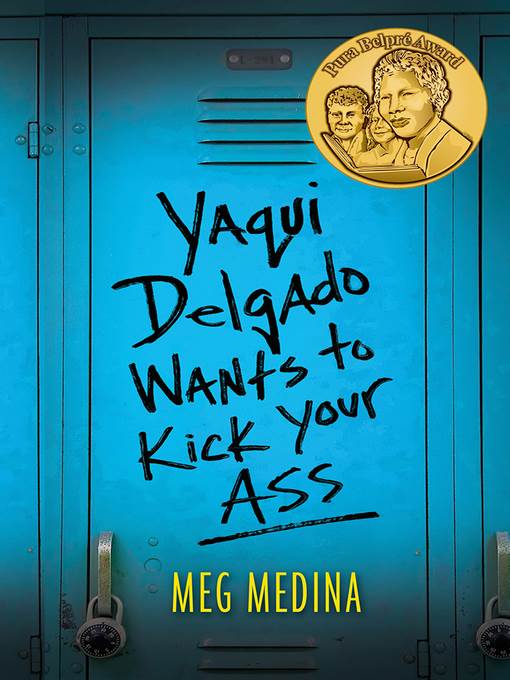
Yaqui Delgado Wants to Kick Your Ass
فرمت کتاب
ebook
تاریخ انتشار
2013
Lexile Score
670
Reading Level
3
ATOS
4.3
Interest Level
9-12(UG)
نویسنده
Meg Medinaناشر
Candlewick Pressشابک
9780763663544
کتاب های مرتبط
- اطلاعات
- نقد و بررسی
- دیدگاه کاربران
نقد و بررسی

thumsup - It's sad how being the victim of bullying should take over your life, and you can't feel anything but worry. I want to know how she gets through all the harassment.

March 25, 2013
High school sophomore Piddy Sanchez can't catch a break. She's just moved and transferred schools, separating her from her best friend. Piddy's curvy figure attracts the attention of both boys and school bully Yaqui, who is jealous and won't accept ambitious and independent Piddy into her group of Latinas, and threatens to harm her. Piddy's life is complicated enough before Yaqui's cruel threats and violent attacks. Outside of school, Piddy works with a flamboyant family friend at a hair salon; has just discovered that her traditional mother may have secrets about Piddy's absent father; develops romantic feelings for a childhood friend; and worries if her dream of working with animals can come true. When Yaqui takes things too far, Piddy has to decide what she is willing to do to defend herself. Piddy is a strong heroine whose sense of self is realistically jarred by her conflicting emotions. Medina (The Girl Who Could Silence the Wind) effectively prods at the motivations behind bullying (without excusing it) and sensitively explores the delicate balance between belonging and maintaining individuality. Ages 14âup. Agent: Jennifer Rofé, Andrea Brown Literary Agency.

April 1, 2013
Gr 7 Up-Piedad Sanchez moved at the beginning of her sophomore year, and a few weeks into classes at her new school a girl comes up to say that "Yaqui Delgado wants to kick your ass." As a first line, it sets the focus for Piddy, who has always had friends, gotten good grades, and managed quite well in her old school. There's no real reason for the enmity, but the threat is more than real and begins to permeate Piddy's life. Gradually readers see that her mother's best friend, who works at a hair salon and has been her support, is the only adult who even has a clue about what is going on. The Queens, New York, neighborhood is solidly Hispanic and the language reflects the culture. Piddy does a downward spiral as the torment gets increasingly worse. The school reaction and the dilemma she faces are realistically portrayed. Yaqui can get to her in and out of school, and she is vulnerable to being terrorized by a whole group of Yaqui supporters. The way that the abuse and threats impact Piddy to try to become a bad girl herself is logically presented. The plight of a pair of abandoned kittens parallels her own loneliness and loss. The Latino cultural milieu adds a richness and texture that lifts this up above many problem novels. The plot points are dexterously intertwined, and the characters are distinct. A real bonus for those looking for a bullying book for older readers that is not simplistic.-Carol A. Edwards, Denver Public Library, CO
Copyright 2013 School Library Journal, LLC Used with permission.

Starred review from January 15, 2013
A nuanced, heart-wrenching and ultimately empowering story about bullying. When 15-year old Piedad Sanchez's mother moves them to another part of Queens, Piddy is unprepared for the bullying that awaits her at her new school. Yaqui Delgado doesn't know Piddy but decides she's stuck-up and shakes her ass when she walks--accusations weighty enough to warrant a full-fledged bullying campaign. As her torments escalate, readers feel the intensity of Piddy's terror in her increasingly panicked first-person narration. Interweaving themes of identity, escapism and body image, Medina takes what could be a didactic morality tale and spins it into something beautiful: a story rich in depth and heart. Piddy's ordeal feels 100-percent authentic; there are no easy outs, no simple solutions. Displaying a mature understanding of consequences and refreshingly aware (no deducing supporting characters' feelings before the protagonist, here), Piddy also exhibits an age-appropriate sense of vulnerability. The prose is both honest ("growing up is like walking through glass doors that only open one way--you can see where you came from but can't go back") and exquisitely crafted ("Fear is my new best friend. It stands at my elbow in chilly silence"). Far more than just a problem novel, this book sheds light on a serious issue without ever losing sight of its craft. (Fiction. 13-18)
COPYRIGHT(2013) Kirkus Reviews, ALL RIGHTS RESERVED.

April 15, 2013
Grades 8-11 When Piedad Piddy Sanchez hears that Yaqui Delgado is going to crush her, she has no idea why she has become a target of one of the roughest girls in her new Queens school. But Yaqui tells everyone Piddy is a skank who shakes her ass when she walks, and as the bullying escalates from threats to physical attacks, Piddy finds herself living in constant fear. A strong student with a bright future at her old school, Piddy starts skipping school, and her grades nosedive. After a truly upsetting attack on Piddy is uploaded to YouTube, she realizes this isn't a problem she can solve on her own. Medina authentically portrays the emotional rigors of bullying through Piddy's growing sense of claustrophobic dread, and even with no shortage of loving, supportive adults on her side, there's no easy solution. With issues of ethnic identity, class conflict, body image, and domestic violence, this could have been an overstuffed problem novel; instead, it transcends with heartfelt, truthful writing that treats the complicated roots of bullying with respect.(Reprinted with permission of Booklist, copyright 2013, American Library Association.)

























دیدگاه کاربران